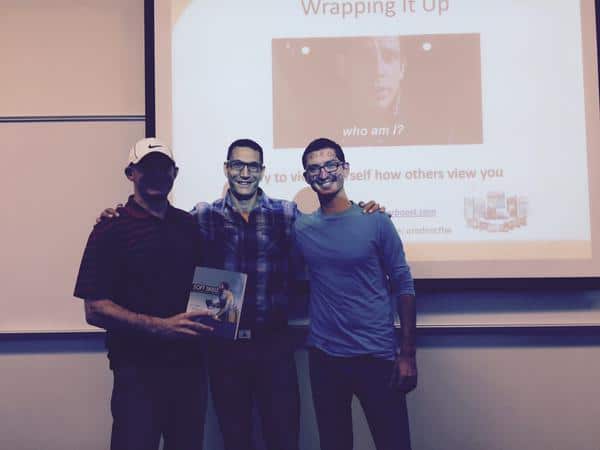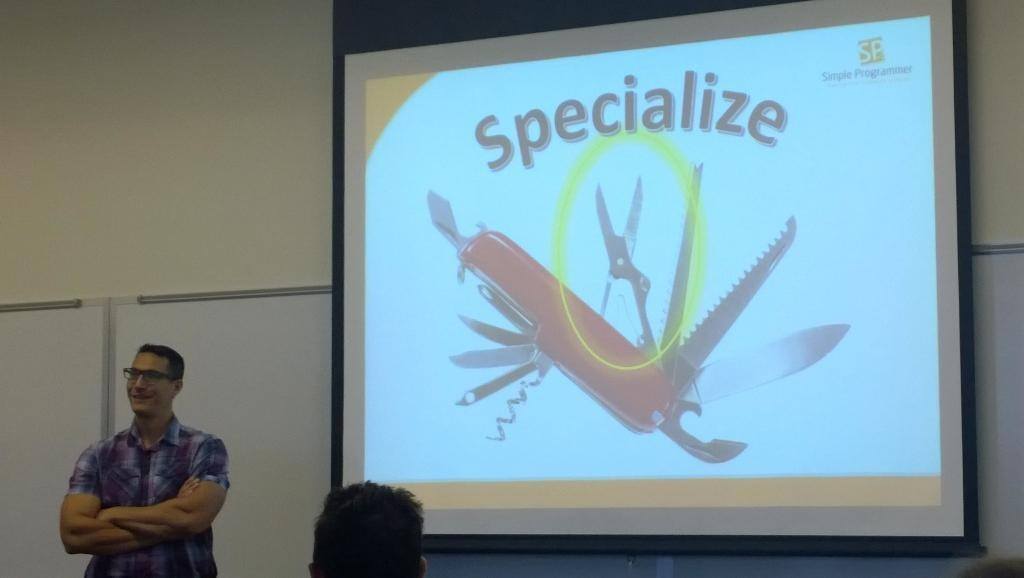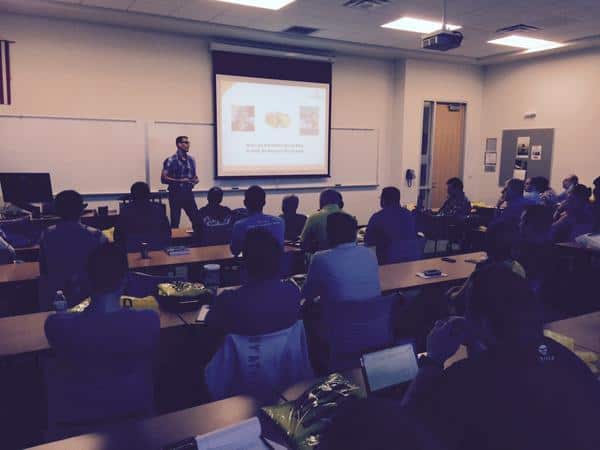I just came back from Orlando Code camp, so I thought I'd do a post talking about why speaking at a code camp is a great opportunity and why—even if you think you have nothing to talk about or teach—you should be speaking at a code camp near you.
Now, just in case you aren't familiar with code camps, code camps are usually free events that happen over the weekend where programmers and other coders get together and give a bunch of presentations on a bunch of different topics.
Some code camps are huge, but most code camps are fairly small.
The one I attended in Orlando this weekend had about 600 people at it.
You can really think of a code camp as a small, free conference where just about anyone can speak.
And that is the key…
You, yes you, are anyone.
Code camps, speaking and you
Look, I know that it can be intimidating to speak in front of a crowd.
The first time I ever spoke in front of any audience, I was a complete wreck.
I was nervous, I was anxious about what I was going to say, how people would react. I was afraid I'd screw something up or that I'd say something stupid and people would disagree with me. I wondered whether I even had anything valuable to say at all.
Getting up there and speaking was difficult.
I remember stepping up to the podium after I had finally connected my laptop and had my slides on the screen.
I remember trying to will myself to stop sweating and shivering at the same time—I didn't even know how this was possible.
My teeth were chattering and my voice was cracking and I couldn't will myself to stop.
I literally had to slow down to take a few deep breaths so I could continue.
The presentation went horrible.
Well, not horrible, but it wasn't smooth.
I don't know how many times I said “um,” but it was pretty close to every other word.
Multiple people were falling asleep at the desks—not even trying to pretend to be awake.
I was finished way before the allotted time, so I was uncomfortably trying to draw out the last slide as long as possible.
When, the talk was finally finished, the 4 or 5 people who were left unceremoniously walked out.
I looked down at my shirt and realized the armpits were soaked through.
But, guess what? I did it.
Yes, it didn't go well.
Yes, I didn't feel like ever doing it again.
No, I didn't become some super-star developer, just because I gave one talk. Recruiters were not lined up to hand me lucrative job offers.
But, I had accomplished something great on that day.
I had conquered a fear.
I had done something that made me feel extremely uncomfortable—and although I didn't come out feeling a lot more comfortable, I had practiced courage.
See, there is a myth about courage.
Most people are under the false impression that courage is the absence of fear.
Courage is not the absence of fear.
In fact, you can't be courageous unless you are also afraid.
True courage is when you act in spite of a fear. When you say “f%&! it” and you do it anyway.
Just say F%&! it!
Seriously.
I know you have all kinds of excuses why you can't speak at a come camp or other local event.
If you wanted to make a list of all the reasons why you can't speak at the next code camp in your area, I am sure you could fill a whole page with seemingly valid reasons:
- You aren't good enough
- You don't have anything worthwhile to talk about
- Someone else is already going to talk about what you know about
- Someone knows more about your topic, so you are unqualified
- You're afraid
- You don't know what to say
- You don't know how to prepare a presentation
- You just started
- You're not ready yet
- You don't have enough time
- Your dog is sick
Blah, blah, blah…
Do you know what all of those things are?
They are excuses.
Excuses will not get you anywhere in life.
There are always excuses—reasons why you can't, or shouldn't do things in life.
But sometimes you just have to say “f%&! it!” and do it anyway.
What is the worse that could happen?
I mean really.
So what if you suck?
So what if you suck hard?
Will it really be the end of your life?
Will it even really matter the very next day?
If you want to grow you have to continuously be putting yourself in uncomfortable situations.
It's only by doing this that you can gain true mastery of yourself.
It's only by doing this that you can learn to start living your life instead of letting your life live you.
Forget about all the bad things that could happen.
Forget about all the reasons why you can't get up there and speak about something, and just pick a topic, commit to it and do it.
Whether it goes good or bad doesn't matter.
It probably took about 5 or 6 talks before I gave a talk that I would have considered “good” in any way, shape or form, but each time I stood up there and conquered my fears, I became a little better and—more importantly—I became a little stronger inside.
The second time I gave a talk, I still sweat through my shirt, but it was a little less and I didn't care as much.
The third time I gave a talk, I didn't sweat at all and I could almost talk without my teeth chattering.
By the fourth time, I could actually focus on the content of my presentation, instead of my fear.
Embrace failure
Want to give a great presentation at code camp?
Here is what you do:
Get a piece of paper and draw 10 boxes on it.
Every time you give a talk and it sucks, check one box.
Your goal is to get all 10 boxes checked.
Screw up 10 times. See if you can knock out 2 in a single day.
Once you check all 10 boxes with “sucky” presentations, you'll be ready to deliver a good one.
In fact, you might even deliver a good one before you get all 10 boxes checked—but don't count on it and don't focus on it.
Just focus on screwing up 10 times.
Trust me, it's a goal anyone can achieve.
Don't worry about getting good, until you master being bad first.
Own it.
Own the suckiness.
Give it all you've got and hope that it sucks anyway, because the more it sucks, the more you can grow, and you only grow when you check off one of those boxes.
We tend to think of failure as a bad thing, but it's not.
Giving up is a bad thing. Failing is a good thing. Failing means progress.
The benefits of speaking at a code camp
I was going to talk to you about the benefits of speaking at your next code camp.
I was going to list a bunch of positive reasons why it will be good for you, how you'll get to network and meet new people, how speaking will open up doors and opportunities for you, how you'll learn by teaching, etc. But that's a waste of time, because you already know the benefits.
And besides, those benefits are not nearly as important as what happens to you.
You grow.
You start to become a different person.
Yes, the effect isn't dramatic. It takes times, but eventually it happens.
Any guess what else?
What you have to share might just be valuable enough to help someone else—especially if you are willing to take the time to get good at sharing your knowledge.
In fact, that is the primary reason I still speak at code camps today.
There is no better feeling than impacting someone in a way that will cause them to make a positive improvement in their life.
Sure, I realize that speaking in front of crowds isn't for everyone.
But have you tried it?
Have you given it a chance?
Or have you allowed that long list of excuses to get in your way?
When I was growing up, I had the impression that it wasn't OK to be afraid.
I thought that being afraid was weakness.
That because I was afraid in certain situations, I was a failure.
Only now do I know that it is OK to be afraid.
That there is nothing wrong with being afraid.
The problem is not doing anything about.
The problem is just accepting it.
Be afraid. Be nervous. Be doubtful and unsure of yourself, but do it anyway.
Some additional resources to check out
Looking to speak at your first code camp, or just become a better public speaker in general?
Here are a few resources that might help you on your way:
- Book on public speaking: Stand and Deliver: How to Become a Masterful Communicator and Public Speaker
- Creating presentations: Presentation Zen: Simple Ideas on Presentation Design and Delivery
- John Papa's Pluralsight course: The Art of Public Speaking and Effective Presentations



